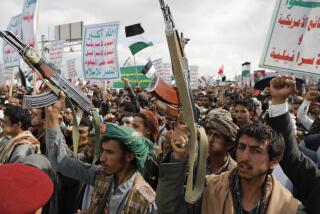Yemen’s protesters angry but also ambivalent
- Share via
Reporting from Sana, Yemen — Less than two blocks away from where anti-government protesters clash daily with supporters of Yemeni President Ali Abdullah Saleh, children in green uniforms ambled home from school. Women hung their laundry on sundrenched rooftops, and a shopkeeper restocked pink soda and biscuits in neat rows.
Despite nearly two weeks of often violent protest in Yemen, including shootings Tuesday night that left two anti-government protesters dead, according to an ambulance driver, life for most people in this dusty, Arab capital hardly feels revolutionary. That atmosphere reflects the nuanced and relatively circumscribed nature of Yemen’s current unrest.
Although many Yemenis are angry at the state of their country, where 35% unemployment, high prices and a nearly stagnant economy make life extremely difficult, they are not agreed on the best way to fix things. None of the various groups — Saleh’s supporters and opponents, members of the political opposition coalition and tribal factions — are acting monolithically. Instead, they are reflecting the diverse and complex social and political fabric of Yemen.
“There is not a simple answer,” said Mohammed Foneni, 20, a teacher in Sana, silently watching the pro- and anti-Saleh groups gather in front of Sana University, the battlefield of recent days. “All the Yemeni people — poor, rich, north, south — they are angry. They are very, very angry, but they do not know their way. They do not know which way to go.”
The most common chant at recent protests have been an unequivocal call for Saleh to step down, but individual protesters’ opinions are more nuanced. Most would like to see sweeping economic and political reforms, but some believe that can happen within the framework of Saleh’s government. Others don’t.
Similarly, some government supporters, who carry cardboard images of Saleh that are borne shield-like across their chests, are not necessarily pro-Saleh, even if they’ve taken over the university’s entrance with more than 20 tents.
“We respect the president, yes. And yes, we want the president to step down in 2013 when his term is over,” said Malik Hassan, 24, standing in the center of the pro-Saleh camp Monday. “In 2013, we will elect a new president peacefully, using the polls.”
The coalition of political opposition parties, the Joint Meeting Parties, has released a statement in support of the anti-Saleh protesters but did not call for the president’s resignation.
“We support the people, but we wish they had waited a little bit to protest so much,” said Mohammed Qahtan, a leader from the opposition Islah, or Reform, Party. “The reform movement in Yemen requires wise deliberation. We need to be careful against taking an impulsive course of action, or there will be losses.”
Meanwhile, a handful of other members of the JMP stood shoulder to shoulder with protesters Sunday night.
Yemen’s motley quilt of tribal allegiances, which may ultimately decide political power in this corrupt and beleaguered nation, is similarly divergent. Thousands of tribesmen have gathered recently in circus-sized tents, labeled according to their tribe in Tahrir Square in central Sana, but the groups are hardly in Saleh’s pocket. Historically, Yemeni tribes, including Saleh’s small Sanhan clan, have thrown their weight behind whichever leader seems most likely to be able to support them both politically and financially.
Abdulrahman Ahmed, a taxi driver, observed the demonstrations Monday at Sana University from the curbside peanut gallery, crammed with dozens of other people like him. He said he was neither pro- nor anti-Saleh.
“I don’t think Saleh is good. He is a thief. But if I tell him to step down, who will take his place? What will happen then? There will be destruction, chaos,” he said. “I have a daughter. I have a son. What can I do?”
Edwards is a special correspondent.
Staff writer Jeffrey Fleishman in The Times’ Cairo bureau contributed to this report.
More to Read
Sign up for Essential California
The most important California stories and recommendations in your inbox every morning.
You may occasionally receive promotional content from the Los Angeles Times.










